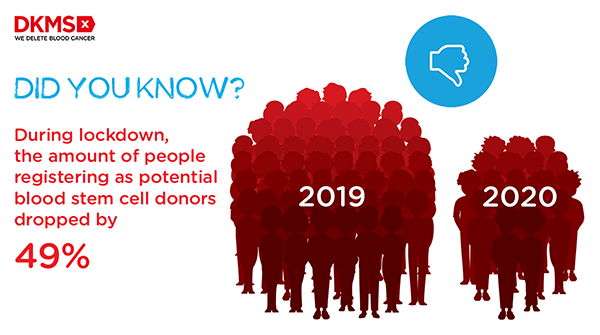Brits unaware blood stem cell donation could save lives
This Blood Cancer Awareness Month (1-30 September 2020) we are appealing for more people to register as potential blood stem cell donors, after a recent survey shows Brits are unaware a blood stem cell donation could help save lives We challenged 1,000 people from across the UK on their knowledge and awareness of blood stem cell donation.
In a bid to encourage the nation to rally together to help combat the impending influx of new blood cancer cases caused by a delay in diagnoses from Covid-19 We’ve seen a worrying increase in the gap in supply of blood stem cell donors and the demand for a blood stem cell transplant, even more so than before the lockdown. We have also seen a huge decline in new registration figures by 49% - so it’s important more than even to raise awareness.
The facts and figures
The survey found that while Brits want to help people with blood cancer, there is still widespread confusion and uncertainty about what blood stem cell donation is and what it entails which is holding people back.
Over half of respondents (55%) admitted to not knowing that blood stem cell donation can be an effective treatment for people with blood cancer. While 74% said they would definitely donate their blood stem cells to help save a life, less than 1% of Brits have registered to become a blood stem cell donor during the pandemic, showing a gap in action, intention and awareness.

Misconceptions around donations
Among the biggest misconceptions, over two thirds (67%) of people think the donation process is invasive, over half (54%) believe the process is difficult and painful (57%) and over 1 in 4 (27%) wrongly think the majority of donations involve a needle in the spine.
In reality around 90% of all donations are made through a method called peripheral blood stem cell (PBSC) and the other 10% of cases, donations are made through bone marrow collection. Contrary to what people think, bone marrow is not extracted from the spine, but from the pelvic bone using a special thin sterile needle.
With over half the population (55%) thinking blood stem cell donation could endanger their health, they should feel motivated to take the first steps and register by knowing that blood stem cells regenerate within two weeks, so it’s a small price when it comes to potentially saving a life.
Dedicated to the fight against blood cancer, Jonathan Pearce, Chief Executive of DKMS UK, said: “Knowing that the reason a lot of people haven’t registered as a blood stem cell donor is due to misunderstanding is in some way positive. It means this Blood Cancer Awareness Month we have an opportunity to drive lifesaving action by simply shouting about how straightforward, yet vital the blood stem cell donation process is.
"At DKMS, we are dedicated to the fight against blood cancer. In the UK we are proud to have registered over 650,000 blood stem cell donors and helped to give over 1,000 people a second chance at life. Yet, the number of donors sadly comes nowhere near to meeting the demand from people desperately seeking a vital donation from a complete stranger. The potential imminent spike in blood cancer diagnoses will mean even more will need to rely on the kindness of a stranger to give them extra time with their loved ones."
How you can help
Support us this Blood Cancer Awareness Month by becoming a #LifesaverInLockdown if you are aged between 17-55 and in general good health check your eligibility and request a home swab kit today If you're not eligible or you're already registered, why not check the other ways to get involved in the fight against blood cancer by taking part in the #20for20 challenge and help us cover donor registration costs.